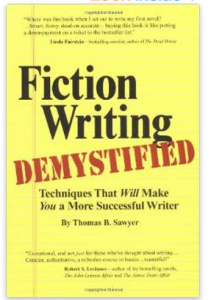Jerry B. Jenkins's Blog, page 31
June 10, 2013
More from Tom Sawyer
Last week I offered insights gleaned from my well-worn copy of Fiction Writing Demystified. Here’s more from Thomas B. Sawyer’s great book:
“Don’t be afraid to give your protagonist an attitude that may be irritating to others in your …
Read more...
June 3, 2013
Writing Fiction? You Need This Book . . .

I’m thrilled to say I’ve discovered one of those books, you know, the kind you don’t dare lend out. On vacation shortly before tackling a deadline, I took Fiction Writing Demystified with me and nearly beat it to death. The cover is curled and chlorine from the pool stains pages dog-eared by many aha! moments.
I read every writing book I can find, and this is easily the best I’ve seen since Dean Koontz’s How to Write Bestselling Fiction in 1981. My enthusiasm for Koontz’s book has been corroborated by the fact that it is now selling for several hundred dollars per first edition at used-book stores and on line.
Thomas B. Sawyer was head writer and producer of the hit TV series Murder, She Wrote. He has written nine network series pilots, a hundred episode scripts, and has worked on fifteen series.
He’s been nominated for both an Edgar and an Emmy and was co-creator of Plots Unlimited software and its successor, Storybase. But for now let me exult about Tom’s book, Fiction Writing Demystified: Techniques That Will Make You a More Successful Writer.
I urge you at whatever stage you find yourself in your writing career to check it out. [Caution: it contains some earthy language.]
Gems from Tom Sawyer’s book
Perhaps, like Tom, you’ll find that you seem to instinctively know more than you thought you did “… the result, I suspect, of an almost universal, close-to-saturation exposure — by the time we reach adulthood — to stories, of our having read or viewed or otherwise absorbed hundreds or even thousands of them — from the classic children’s tales to countless episodes of I Love Lucy and other shows, to movies, novels, and so on.”
Do you need to be reminded, as I do, that as writers we are entertainers?
“… no matter how lofty our literary intentions, [we] want an audience, or we hope to find one … and we want to hold its attention. Strike that: we must hold its attention. To accomplish that, we must entertain. It’s an obligation. This is true whether we’re poets, peddlers, or preachers.”
Never forget that your novel needs what Sawyer calls “the money scene,” which he describes as “the facedown on the dusty Western street, the big emotional moment between two of your characters, the climactic battle, or the solitary protagonist’s instant of revelation.”
So what are you waiting for? If you’re serious about fiction writing, you need this book. And do not, under any circumstances, lend it out.
What are your favorite how-to writing books?
The post Writing Fiction? You Need This Book . . . appeared first on Jerry Jenkins Writers Guild.
Learning from Tom Sawyer
May 27, 2013
Don’t Ask, Don’t Ask
Writer, Do Yourself a Favor: Don’t Be a Mooch
 Okay, be forewarned: this post has the potential to make you squirm. But I’ve promised you a behind-the-scenes look at writing, so put on your big kid pants.
Okay, be forewarned: this post has the potential to make you squirm. But I’ve promised you a behind-the-scenes look at writing, so put on your big kid pants.
As a writer, you may eventually rub elbows with people of celebrity. How you conduct yourself and your business in those situations can help determine your future.
I have made much of my living penning as-told-to-autobiographies of famous people. Early on I established a policy: I would not ask them for anything other than what the publisher was paying them for.
They had already committed to giving me large blocks of uninterrupted time for interviews and also shadowing time–when I just hung in the background and watched them interact with their families, teammates, the press, and colleagues. This helped me catch their natural voice, which was often different from their interview voice.
I noticed that almost all the other people in their lives had an agenda, something they wanted. People either hinted at what they were after or came right out and asked for pictures, pennants, autographs, tickets, or even to have the celeb call a relative and wish him happy birthday.
I decided I would never ask for any of that, and to my surprise, they noticed and appreciated it. It was an early, critical decision I made as a writer.
As I say, I expected only their time, for which they were being handsomely paid. Otherwise, I did not have my hand out, asking for or expecting anything. That helped when friends prevailed upon me to ask them for such things. I’d say, “You know what? I don’t even ask for those things for myself or my sons.”
The last thing I wanted was to leave a memory of myself as just another moocher.
In almost every instance, eventually the celebrity himself or a manager or agent would say, “I noticed you haven’t asked for anything. Can we send you some pictures for your kids? Would you like a few tickets to a game?” Now it was time to gratefully accept.
If you find yourself in a similar situation, I highly recommend the don’t ask policy. Mutual trust and respect is crucial for such important work. Strive to be low maintenance and practice being the giver in the relationship, not the taker.
You’d be surprised at the meaningful referrals that result from such a posture.
Have you ever worked with a celebrity? Please share what have you learned.
The post Writer, Do Yourself a Favor: Don’t Be a Mooch appeared first on Jerry Jenkins Writers Guild.
It’s the Unspoken Rule Among Writers: Don’t Be a Mooch
 Okay, this post has the potential to either embarrass you or make you squirm, depending on your point of view. But with this blog, I promised you a walk along the inside tracks of writing and publishing . . . so here we go.
Okay, this post has the potential to either embarrass you or make you squirm, depending on your point of view. But with this blog, I promised you a walk along the inside tracks of writing and publishing . . . so here we go.
As a writer, you will eventually brush elbows with or even find yourself working closely with people of various celebrity. And, you will have some critical decisions to make on how you conduct business in those situations.
I used to make most of my living as a writer penning as-told-to-autobiographies of famous people. Early on in my season of working with people in demand, I established a policy: I would not ask them for anything other than what the publisher was paying them for.
They had already committed to giving me large blocks of uninterrupted time for interviews, and also shadowing time, when I just hung in the background and watched them interact with their families, teammates, the press, and colleagues. This helped me catch their natural voice, which was often different from their interview voice.
I noticed that almost all the other people in their lives had an agenda, something they wanted. People hinted at what they wanted, or came right out and asked for pictures, pennants, autographs, tickets, or even to have the celeb call a relative and wish him happy birthday.
I decided I would not do that, and to my surprise, they noticed and appreciated it. It was an early, critical decision I made as a writer.
I asked for only their time, for which they were being handsomely paid, but I did not otherwise have my hand out, asking for or expecting anything. That helped when friends asked me to ask them for such things. I’d say, “You know what? I don’t even ask for those things for myself or my sons.”
In almost every instance, at some point the person himself or a manager or agent would contact me and say, “I noticed you didn’t ask for anything. Can we send you some pictures for your kids? Would you like a few tickets to a game?” Now it was time to gratefully accept. The last thing I wanted was to leave a memory of myself as just another moocher.
If you find yourself in a similar situation, I recommend the don’t ask, don’t ask policy. Mutual respect is necessary when you are doing important work. Be mindful—and even practice—being the giver in the room, not the taker.
Have you ever worked with a celebrity? What have you learned? Please share!
The post It’s the Unspoken Rule Among Writers: Don’t Be a Mooch appeared first on Jerry Jenkins Writers Guild.
May 20, 2013
The Quality Time Myth
May 13, 2013
Is Your Writing Breakthrough Right In Front of You?
 I’d been hearing chirping all morning but thought it was something on the computer. Then a ball of winged chaos came from the fireplace. It looked like a wren and I have no clue how it got into my writing cave. But the terrified little bird taught me an interesting writing lesson.
I’d been hearing chirping all morning but thought it was something on the computer. Then a ball of winged chaos came from the fireplace. It looked like a wren and I have no clue how it got into my writing cave. But the terrified little bird taught me an interesting writing lesson.
Panicky and flitting, the feathery mass banged off the windows, turning my once quiet room inside out. I quickly removed screens from two windows and tried to guide the bird out, but of course he avoided me as if I were a big snake. For several minutes the bird raced back and forth between rooms, desperately flinging itself at the windows I had not opened and ignoring the ones I had.
The lesson should already be obvious. I was the key to this creature’s freedom. I meant it no harm. I provided its means of escape. And yet it continued to try all the other—closed—avenues.
“C’mon, dude,” I muttered, “I’m trying to help.”
Finally I guided the bird to the open window. I’m pretty sure I heard it chirp a swear word as it escaped.
So now I’m back at the keyboard, happy to be back in my element and sensing an open window in my current novel is nearby. I pound the keys and chase the still small voice reminding me, “C’mon, dude, I’m trying to help.”
Are you overlooking the obvious resources in your life that can help you up and over your current hurdles? List five power sources, let’s share!
The post Is Your Writing Breakthrough Right In Front of You? appeared first on Jerry Jenkins Writers Guild.



